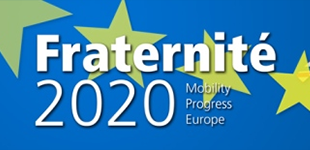Fraternité 2020 is Europe’s very first citizens’ initiative. Its goal is to enhance EU exchange programmes – such as Erasmus or the European Voluntary Service – in order to build a united Europe based on solidarity among citizens.
The European Citizens’ Initiative (ECI) is one of the major innovations of the Treaty of Lisbon, aimed at increasing direct democracy in the EU. The initiative enables one million EU citizens, who are nationals of at least one quarter of the Member States, to call directly on the European Commission to propose a legal act in an area within the competences of the EU. In order to launch an ECI, citizens must form a citizens’ committee composed of seven EU citizens from seven different member states. The first ever such ECI is Fraternité 2020, which was registered on May 09 (Europe day) this year. The decision was announced one day in advance by Vice-President of the Commission Maroš Šefčovič via his Twitter account. Since then eight more ECIs have been registered by the Commission.
In order for an ECI to start collecting signatures online, it needs to be able to set-up the so called ‘Online Collection System’ (OCS). The OCS basically consists of the necessary software plus the servers and a comprehensive risk assessment proving the security of these servers. The OCS needs to be certified by the competent national authority (usually the Ministry of Interior) in the member state in which the servers are located. Member states have up to four weeks for this certification process.
The software has been developed as an open source programme by the Commission that is made available to ECI organisers free of charge. After perennial problems of ECI organisers to set up the OCS themselves (not a single ECI can be signed online to this day!), the Commission announced to organisers in a letter last week that it will also help with the other components of the OCS. All ECI organisers can rely on the data centre premises in Luxembourg for the servers. Also, the Commission will help all organisers with the preparation of the necessary risk assessment to be submitted to the Luxembourg Certification Authority.





